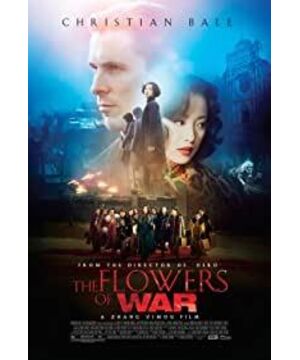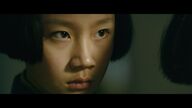Although this story is wrapped tightly, I don't believe Zhang Yimou's heart is pure. He just wants to simply express the real suffering we have suffered and reflect on the suffering. Since "Hero" and "Ten Faces", it has lost an artist's shameless theme commercial film. In the beginning, there should be sufficient doubts about the motives of his actions. An international star represents the American box office, and the women in a group of painted boats, like several concubines in the red lantern, are symbols of erotic consumption with great box office appeal. Moreover, I really didn't see the spontaneous motives of these women, and the motivation for their actions was given by the American pastor. In the face of violence and death, the American gangster was first inspired by religious feelings and turned into a hero. Immediately afterwards, several prostitutes were moved by this feeling and sacrificed their lives for justice. And the background is always the cathedral, always the red cross, always the lily window and chant. So, this is an American theme, the theme of the Oscars. Without the national feelings of Li Xiangjun and Liang Hongyu, it is destined to be hypocritical.
If we analyze such a film from the perspective of psychoanalysis, if it is a national film, then the "subject" is missing. What do you mean, as a Chinese, you can't find a point in the movie that is suitable for expressing your national identity and national emotion, and makes you identify with it. That soldier is a Chinese hero figure, but dead (like Liu Ye in "Nanjing Nanjing", must be dead, or superfluous). Chinese men are impotent, castrated, phallic, and do not possess a phallus center. We are left with only Americans, schoolgirls, prostitutes. So the American priest became a metaphorical patriarchal symbol. In fact, he is an American punk, but as soon as he puts on religious clothes, he also acquires sexual ability. At the same time, this sexual ability castrated him. He was a rascal without the holy clothes, but he became a saint when he put it on. He had no desire for women. In the end, he engaged the English-speaking prostitute, which is not so much an act. Male sexuality is more of a religious ritual.
The female body is as abused as the violence in movies. Not to mention the commercial selling point of this thing, just showing the body is enough to make feminists extremely disgusted. In the last scene, a woman suddenly wears bright makeup and stands abruptly in a montage technique. This scene is awkward because it is anti-movie technique and anti-realism. This shot is not a restoration of reality, but emerges abruptly, with symbolic emphasis, emphasizing the sexy features of thirteen women who have changed into gray clothes, lined up like a runway show. This symbol is an erotic symbol. They will all be fucked by the Japanese, which will undoubtedly challenge the audience's view of chastity.
Celebrities, sex scenes, pornography, and violence have become synonymous with the Nanjing Massacre, how tense and exciting it is. This has nothing to do with war, reflection on war, human nature, only money, and the strategy of Chinese films to enter Hollywood. How clever is Zhang Yimou to let Chinese women strip their bodies and let Chinese women be raped to seek all The world's box office, seeking an Oscar trophy. Of course, Chinese culture must be exported to the world, and of course foreigners must also have the historical knowledge of the massacre in Nanjing. However, in this way, it always makes people feel uncomfortable.
View more about The Flowers of War reviews









